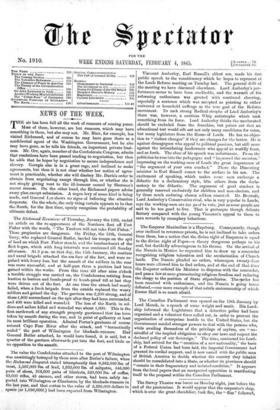Viscount Amberley, Earl Russell's eldest son, made his first public
speech to the constituency which he hopes to represent at the Leeds Reform meeting on Tuesday last. The general drift of the meeting we have discussed elsewhere. Lord Amberley's per- formance seems to have been creditable, and the warmth of his reforming enthusiasm was greeted with continual cheering, especially a sentence which was accepted as pointing to either universal or household suffrage as the true goal of the Reform movement. To each strong Radical strophe of Lord 'Amberley's there was, however, a cautious Whig antistrophe which took something from its force. Lord Amberley thinks the uneducated should be excluded from the franchise, but points out that an educational test would sift out not only many candidates for votes, but many legislators from the House of Lords. He has no objec- tion to " violent changes" if they are changes for the better. He is against demagogues who appeal to political passions, but still more against the intimidating landowners who appeal to worldly fears, and so forth. The close of his speech was unfortunate. From the politician he rose into the pedagogue, and " improved the occasion," impressing on the working-men of Leeds the great importance of "the argument of your own conduct." There the Dissenting minister in Earl Russell comes to the surface in his son. The excitement of speaking, which makes some men exchange a didactic for a declamatory style, lifts others from the decla- matory to the didactic. The argument of good conduct is generally reserved exclusively for children and non-electors, and by those much enduring classes seldom resented. Mr. Beecroft, Lord Amberley's Conservative rival, who is very popular in Leeds, says the working-men are too good to vote, just as some people are said to be too good to live. That is grotesque though delicate flattery compared with the young Viscount's appeal to them to earn rewards by exemplary behaviour.






























